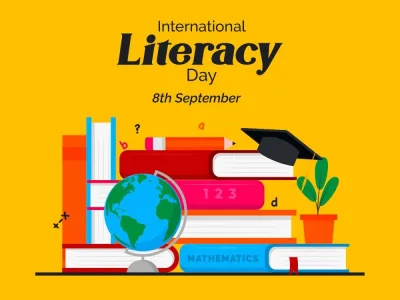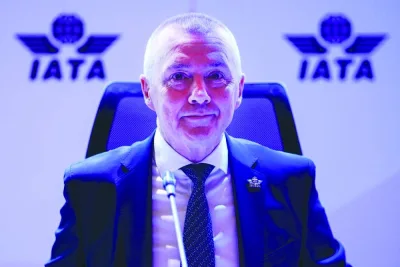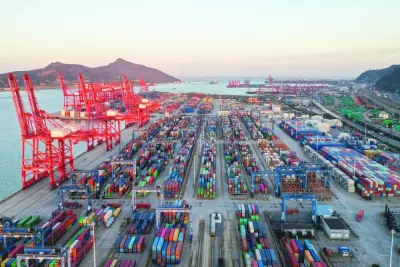The International Literacy Day is an occasion commemorated by the entire human community on an annual basis since 1967. The annual celebration aims to remind the public of the importance of eradicating illiteracy as an important means of spreading knowledge, eradicating ignorance, and as a matter of dignity and human rights. It is also an important occasion for the advancement of society in a sustainable manner to be more familiar with reading and writing skills, which have become indispensable in today's world that is going through a transitional phase that requires concerted efforts.The objectives of International Literacy Day are to promote a world free from illiteracy by improving the basic skills of reading and writing as they are an integral part of the right to education that every human being deserves and that enables them to understand and interpret all matters of life and also facilitates communication and creativity in a world dominated by digital nature. Through it, everyone can participate effectively in society and improves the means of life. Learning allows participation in the labor market, improves health and economic conditions, reduces poverty, and provides more opportunities for a decent life.Despite the progress achieved, literacy challenges still remain as at least 771 million youth and adults around the world still do not possess basic literacy skills, of whom two thirds are women, according to the United Nations. In addition, approximately 103 million children have no access to school and are therefore not learning to basic academics such as how to read, write or count, according to Unesco’s report in 2006.Furthermore, during the Covid-19 pandemic, schools were closed thereby disrupting the education of 62.3 per cent of the world's student population of 1.09 billion. Literacy categories were more affected, as 617 million children and adolescents are not achieving minimum proficiency levels in reading and mathematics.As the whole world's celebration of International Literacy Day for the year 2022 revolves around the theme of "Transforming Literacy Learning Spaces" and developing a new vision of the fundamental importance of learning to read and write, building resilience and ensuring the provision of quality, fair and comprehensive education for all, the year 2023 celebration is under the theme, Promoting literacy for a world in transition: Building the foundation for sustainable and peaceful societies, with a view to honoring the innovative programs that won the UNESCO Literacy Prizes coinciding with World Day at its headquarters in Paris.The importance of literacy efforts and annual celebration lies in the fact that it is an engine for sustainable development, in addition to being an integral part of education and a form of lifelong learning based on humanity. Governments, civil society organizations, companies and all those involved in the educational and educational system have an opportunity to highlight the improvements that have occurred on literacy rates, and to think about how to overcome the rest of the literacy challenges facing the world, as the issue of literacy is an essential component of the United Nations 2030 goals for sustainable development.The UNESCO Strategy for Youth and Adult Literacy (2020-2025) pays special attention to the member countries of the Global Alliance for Literacy which focuses on promoting literacy in formal and non-formal settings with four priority areas: strengthening national strategies and policy development on literacy; addressing the needs of disadvantaged groups, particularly women and girls; using digital technologies to expand and improve learning outcomes; and monitoring progress and assessing literacy skills.In the State of Qatar, the educational system has remarkable achievements in the field of literacy and adult education, with illiteracy registering zero percent among school-age students and 0.95 percent in general, according to statistics released the Planning and Statistics Authority (PSA) in 2020. According to the Ministry of Education and Higher Education, a total of 7,676 were registered for adult education programs in the academic year 2021-2022. Adult education students are registered in all public schools, except for the model ones.The Ministry develops a special educational program for adult education, for students who do not meet the requirements of compulsory education (those who are over 18 years old or have finished preparatory school), and for students who have been removed from daytime education (due to marriage, repeated failure, or work), whether they are working or not to encourage them to continue their education.Adult education curricula are divided into approved curricula for daytime education students in government schools from the fifth to twelfth grade, and special curricula for literacy classes (first cycle and second cycle). They also have special textbooks and curricula that differ from daytime education. The Ministry offers a set of privileges to adult education such as special education services for students with disabilities and providing them with the necessary arrangements and facilities to meet their needs and others.Qatar has two adult education tracks- one related to homeschooling where students of both genders are registered and tested in day schools and another optional track for evening classes. In this context, the newly-adopted adult education program in the State of Qatar offers much resilience and attraction sources including the opportunity for students to accomplish their learning within 10 years instead of 12.The State of Qatar witnessed a record and unprecedented expansion in constructing new schools of all stages, an achievement that can be made only in the most advanced countries, in addition to ensuring the quality of education and improving its quality in line with the wise leaderships unrelenting and generous support for all types, sectors and levels of education, leading to well-established educational renaissance concerned about preparing Qatari citizens well equipped with belief, science and knowledge as the main pillar for development and civilized renaissance.In this regard, the State of Qatar launched initiatives and exerted efforts to provide education opportunities for millions of children in poor countries worldwide, and to construct and restore many educational institutions in Asia and Africa. At top of these initiatives are initiatives of 'Educate A Child', 'Al Fakhoora' and 'Reach Out to Asia' (ROTA), all of which are affiliated with the Education Above All Foundation that was launched in 2012. Its programs work to ensure that all children in the developing world benefit from their right to education, especially those who are not enrolled in school and currently estimated at 59 million children. The Foundation addresses education issues with a special commitment to the most disadvantaged groups in the world through capacity building, resource mobilization, and the establishment of multiple alliances and partnerships.Qatar's policy to eradicate illiteracy began in 1950s when it established the first adult education and literacy center in 1954 to coincide with the beginning of the educational renaissance in the country. Regular classes were opened in late 1956, as part of the efforts to establish the sub-section of education with several units, including those dedicated to evening classes. In 1976, two girls' schools were inaugurated.The State of Qatar also adopted a 10-year plan (1977-1986) for adult education and illiteracy eradication. Qatar effectively contributed to the implementation of the Arab strategy for illiteracy eradication and preparation of the work plan of the Regional Program for the Universalization and Renewal of Primary Education and the Eradication of Adult Illiteracy in the Arab States (ARABUPEAL). Recent years have also witnessed the exchange of experiences and the development of plans and strategies with global initiatives to modernize the fields of education in general, including the field of adult education and literacy. These initiatives have received praise, appreciation and approval from the world and regional and international organizations.Inspired by the value of science entrenched in Islam, the State of Qatar paid great attention to the educational process and scientific research, with the school dropout rate plummeting to zero percent. These achievements were based on the country's belief that the education and literacy of citizens - the real pillars of developments, is a responsibility to be shouldered in a world full of all types of scientific and vocational knowledge.
Wednesday, May 08, 2024
|
Daily Newspaper published by GPPC Doha, Qatar.












